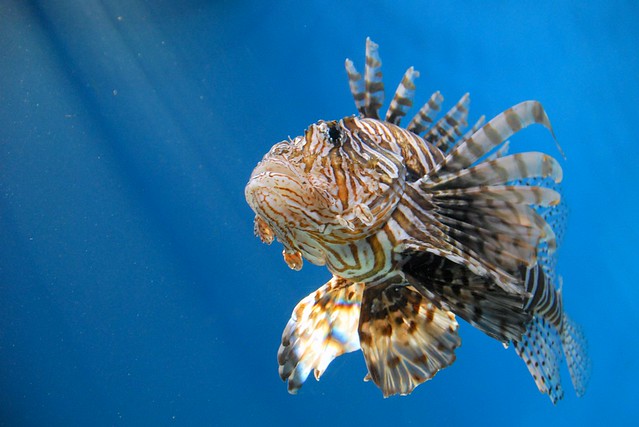We have much more to do and your continued support is needed now more than ever.
No Pride for Lion Fish’s Ferocious Appetite

Asian carp are stealing valuable resources from native Great Lakes fish while Burmese pythons are destroying small mammal populations throughout the Florida Everglades. Similarly, lion fish are invading Atlantic reefs and disrupting the delicate balance of marine ecosystems.
First spotted in the early 1990s, the now established lion fish populations are commonly thought to originate from only six specimens which escaped into the Atlantic after Hurricane Andrew broke aquariums in Florida in 1992. Now, the fish are widespread along the Eastern coast of the United States, from Cape Hatteras, North Carolina, down to the Bahamas, and even all the way north in Massachusetts.
Sneaking to the Top of the Food Chain
Once aquarium fish, lion fish have adapted very well to their new environments. They are quickly replacing top predators like sharks by eating large quantities of prey, such as small fish, invertebrates, and mollusks. In turn, the lion fish has very few natural predators, thanks to its venomous spines, leaving it free to wreak ecological havoc on the coral reefs. In fact, lion fish can devour up to three-quarters of a reef’s fish population in just five weeks.
[youtube]http://www.youtube.com/watch?v=38jYU9bNeAc[/youtube]
Eradication Efforts Abroad
Lion fish are continuing to spread, but there are organized eradication efforts underway. Diving competitions encourage divers to spear as many lion fish as possible and chefs have been introducing lion fish to their menus.
As with any invasive species, lion fish eradication should be aggressive and persistent. With major problems plaguing the world’s waters, like ocean acidification, overfishing, and increased trash and pollution, we need to take drastic steps towards restoring our once beautiful oceans.
![]() Support NWF’s efforts to fight invasive species and to restore and protect our fragile reef ecosystems.
Support NWF’s efforts to fight invasive species and to restore and protect our fragile reef ecosystems.





















